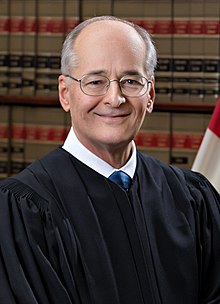Type a search term to find related articles by LIMS subject matter experts gathered from the most trusted and dynamic collaboration tools in the laboratory informatics industry.
Charles Canady | |
|---|---|
 | |
| Chief Justice of the Supreme Court of Florida | |
| In office July 1, 2018 – June 30, 2022 | |
| Preceded by | Jorge Labarga |
| Succeeded by | Carlos G. Muñiz |
| In office July 1, 2010 – June 30, 2012 | |
| Preceded by | Peggy Quince |
| Succeeded by | Ricky Polston |
| Justice of the Supreme Court of Florida | |
| Assumed office September 6, 2008 | |
| Appointed by | Charlie Crist |
| Preceded by | Raoul Cantero |
| Judge of the Florida Second District Court of Appeal | |
| In office November 20, 2002 – September 6, 2008 | |
| Appointed by | Jeb Bush |
| Preceded by | Oliver Green |
| Succeeded by | Marva Crenshaw |
| Member of the U.S. House of Representatives from Florida's 12th district | |
| In office January 3, 1993 – January 3, 2001 | |
| Preceded by | Andy Ireland (Redistricting) |
| Succeeded by | Adam Putnam |
| Member of the Florida House of Representatives from the 44th district | |
| In office November 6, 1984 – November 6, 1990 | |
| Preceded by | Gene Ready |
| Succeeded by | Joe Viscusi |
| Personal details | |
| Born | Charles Terrance Canady June 22, 1954 Lakeland, Florida, U.S. |
| Political party | Democratic (before 1989) Republican (1989–present) |
| Spouse | Jennifer Canady |
| Education | Haverford College (BA) Yale University (JD) |
| Website | Official website |
Charles Terrance Canady (born June 22, 1954) is an American attorney and judge serving on the Supreme Court of Florida since 2008. He previously served as Chief Justice from 2010 to 2012 and from 2018 to 2022.[1]
Prior to his appointment to the Supreme Court, Canady was a judge on Florida's Second District Court of Appeal from 2002 to 2008, and a Republican member of the United States House of Representatives from 1993 to 2001.
Born in Lakeland, Florida, Canady graduated with a Bachelor of Arts from Haverford College in 1976 and a Juris Doctor from Yale Law School in 1979. He was admitted to the bar the same year and began his practice in Lakeland. In 1983, he was hired as the legal counsel for the Central Florida Regional Planning Commission. From 1984 to 1990, Canady served as a member of the Florida House of Representatives, initially elected as a conservative Democrat, he switched parties in June 1989. The change created many hard feelings as it happened after he accepted Democratic money for his re-election campaign. He ran for the Florida State Senate in 1990, but was unsuccessful.
In 1992, Canady made a successful bid for the U.S. House of Representatives, narrowly defeating his Democratic opponent Tom Mims. In Congress, Canady was credited for coining the term "partial-birth abortion" while developing the Partial-Birth Abortion Ban Act of 1995.[2][3] According to Keri Folmar, the lawyer responsible for the bill's language, the term was developed in early 1995 in a meeting among herself, Canady and National Right to Life Committee lobbyist Douglas Johnson.[4] Canady could not find this particular abortion practice named in any medical textbook and therefore he and his aides named it.[5] He was one of the House managers appointed to prosecute the impeachment trial proceedings of President Bill Clinton.[6] He did not seek re-election to a fifth term in 2000, keeping a term limits pledge he made in 1992.
After leaving Congress, Canady served as general counsel for Florida Governor Jeb Bush before he was appointed a judge on the Second Florida District Court of Appeal in 2002, taking seat in November of that year. On August 27, 2008, Governor Charlie Crist appointed Canady to the Supreme Court of Florida to replace Justice Raoul Cantero, who was returning to private practice. He became the 82nd justice of the Florida Supreme Court on September 6, 2008.[7]
In 2013, Governor Rick Scott signed the Timely Justice Act (HB 7101)[8] which overhauled the processes for capital punishment;[9] the United States Supreme Court struck down part of this law in January 2016 in Hurst v. Florida,[10][11] leading the Florida legislature to pass a new statute.[12] The new sentencing scheme came before the Florida Supreme Court in October 2016, which held that a death sentence must be issued by a unanimous jury.[13] Canady was one of two justices to dissent from this opinion, with coverage noting his inclusion amongst Donald Trump's list of potential U.S. Supreme Court nominees[14] which was released less than a month earlier.[15]